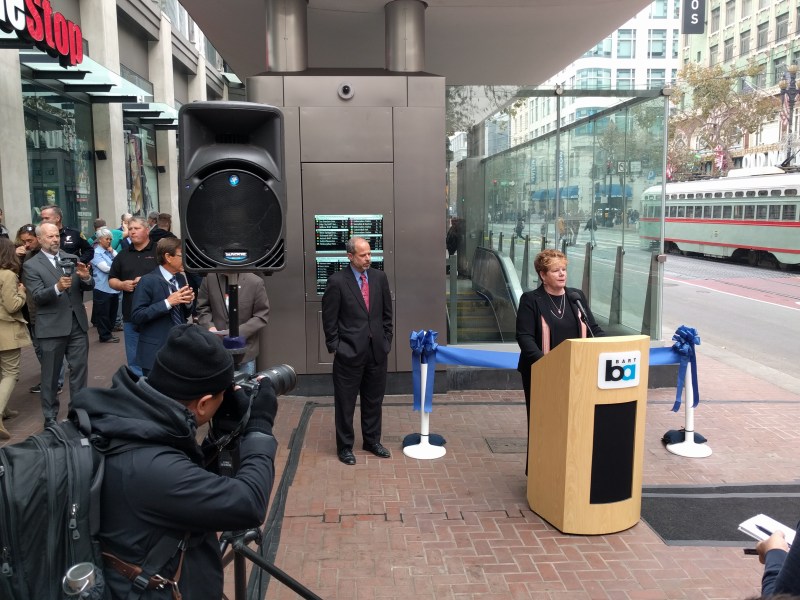Note: GJEL Accident Attorneys regularly sponsors coverage on Streetsblog San Francisco and Streetsblog California. Unless noted in the story, GJEL Accident Attorneys is not consulted for the content or editorial direction of the sponsored content.
Women represent only 15 percent of the transportation work force, according to a new study from the Mineta Transportation Institute (MTI) at San Jose State University.
Jodi Godfrey and Robert Bertini, the authors of the study, entitled Attracting and Retaining Women in the Transportation Industry, cited a lack of female role models and mentors as a significant deterrent to women joining the transportation industry.
Here in the Bay Area, there are, of course, women in positions of leadership in transportation, such as BART's General Manager Grace Cunican, as seen in the lead image. And Therese W. McMillan starts as the head of the Metropolitan Transportation Commission next month. But even with women leaders at the top of some agencies, there's still a lot of work to do to improve diversity throughout the ranks.
"I definitely feel like I see women in leadership positions, but not at parity," said Liz Brisson, a transportation advocate and a planner at SFMTA. She added that she sees more parity among planners who entered the transportation industry in the last decade but "...if you look at other types of transportation positions: from engineering to construction management to operations to maintenance--those seem to be the parts of agencies that are less represented by women."
Obviously, disparities in the workforce are a problem in and of themselves. But related to it: do disparities inside an agency automatically lead to transit that doesn't serve all riders?
Women we spoke to believe the answer to that is a definitive yes. As reported by Streetsblog USA, women are roughly half as likely as men to take advantage of new transit lines, in large part because of a concern for personal safety. Some transit agencies address this issue thought "night stops," which allow bus drivers to drop patrons off closer to home rather than at a designated stops during off hours. But, of course, without women bus drivers, planners, and managers, this kind of simple solution may be overlooked.
Another example: "A lot of office bike parking is for lightweight road bikes that you can lift and hang vertically. Many women’s bikes, and especially those designed to carry children, don’t fit that mold," said Alexandra Sweet, Senior Associate with NelsonNygaard consulting.
Meanwhile, Brisson told Streetsblog she's concerned about a lack of diversity that goes beyond gender imbalance. She said agencies are hamstrung when a homogeneous slate of planners enters a historically African-American or another minority neighborhood to discuss new transit lines or street changes. "You can build trust with a community even if you look different, but it's harder, especially in communities that have been shat on by government for so long."
"Culture really matters and it’s hard to understand other people’s cultural experiences unless you’ve walked in their shoes. That’s super important for transportation. It’s a blind spot," said Ratna Amin, SPUR's long time transit expert who is currently transitioning to Deutsche Bahn Engineering and Consulting, in an interview last month with Streetsblog.
Tam Tran, a planner at the City of San Francisco and president of the Bay Area Chapter of Women in Transportation Seminar, a group dedicated to bringing more women into the field, added that it's important to keep the needs of disabled people and women with strollers in mind. "When you put together a transit plan you have to consider women more than men; you have women who are shopping, have children, have babies...women are very important as a part of the range of users."
"Although we’ve made great strides in egalitarian parenting, women still do the majority of child rearing," said Sweet. "When we don’t plan for women, we don’t plan for children."
She added that the purpose of transit is to serve everybody--but "how can we serve everybody if the decision makers aren’t representative of the public? To get women to those positions of leadership, we have to create a working environment and culture that not only supports women but champions them."
Meanwhile, the study has recommendations for improving diversity. From a summary of the results:
- Diversify the perception of the industry to better publicize the presence of women in the industry
- Connect with women early, and not just early in their careers but early in their school years
- Have a flexible and encouraging work culture to remove the stigmas of a male-dominated field
- Attract a diverse talent pool that focuses on how organizations foster both communal and agentic goals
According to Bertini, “gender equality and gender diversity in the workforce are key to the economic growth required for companies to win the talent war. It is more important than ever to ensure that the talent pool encompasses all qualified candidates, and women are the largest pools of untapped labor globally.”
You can read the full study here.
Do you work at one of the Bay Area's transportation agencies? Do you think management is adequately promoting, recruiting, and retaining women and minorities? And how are disparities inside an agency reflected in its decisions about planning and operations?
Post your thoughts below.






